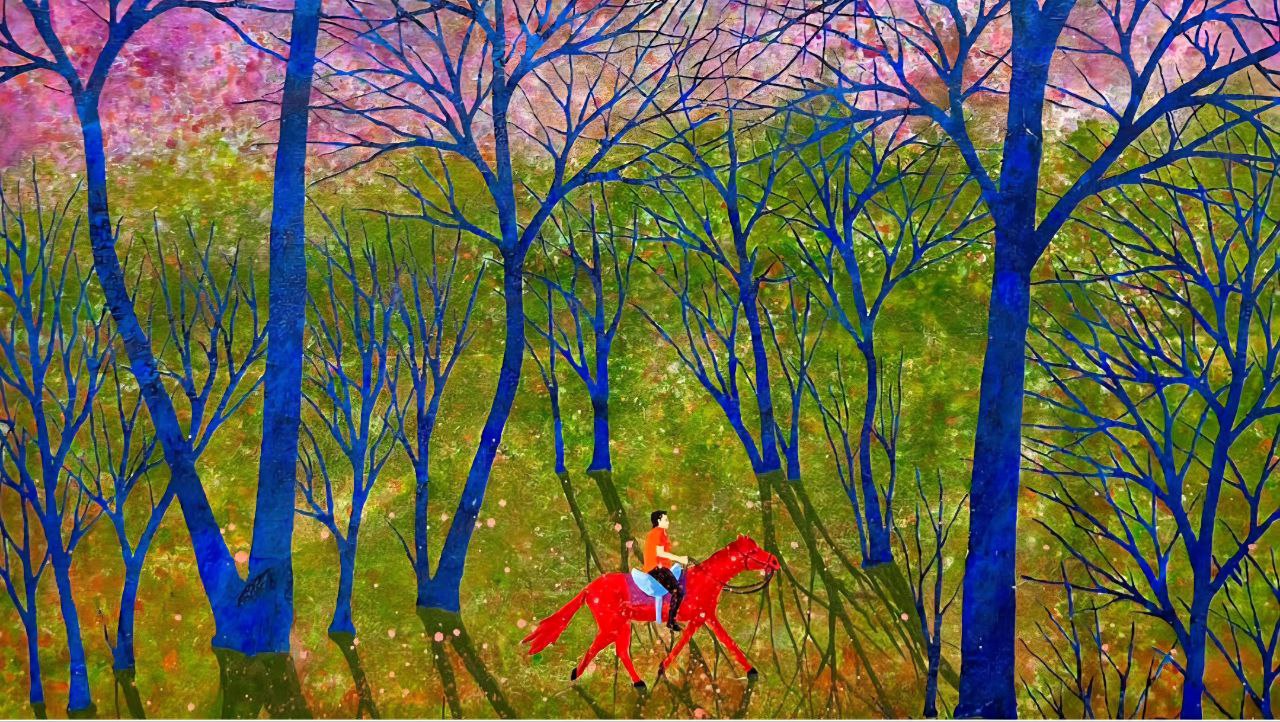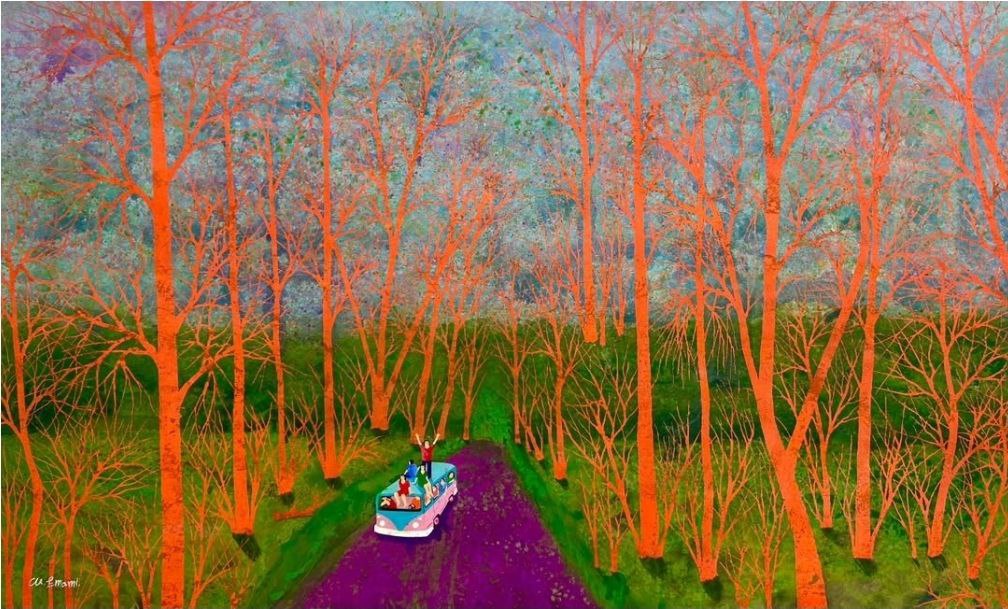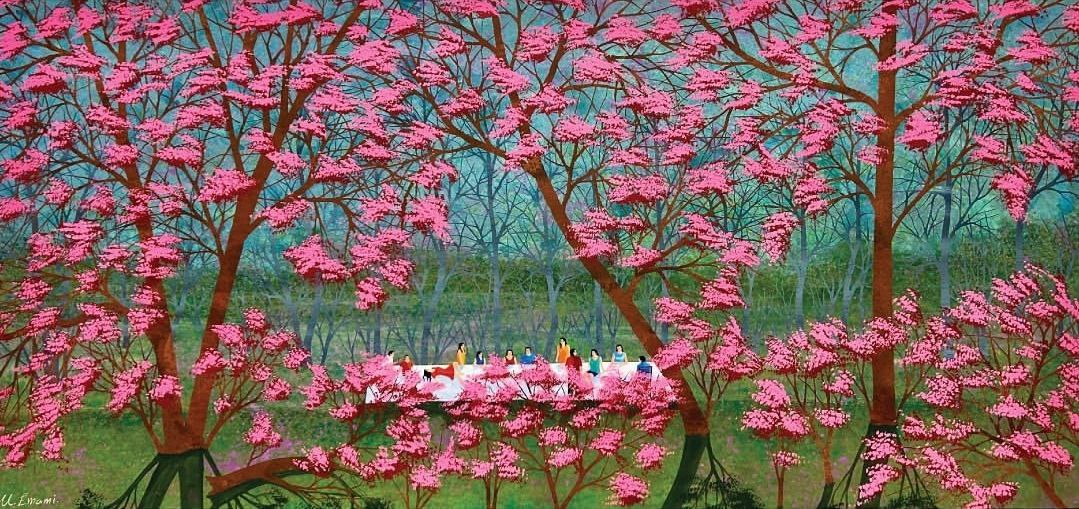نگاهی به نمایشگاه «پیش از آنکه تصویر شود» مصطفی امامی به قلم امیرحسین شریفان
این نوشتار، زاویه نگاهی است شخصی و تحلیلی در مواجه با نمایشگاه انفرادی نقاشی های مصطفی امامی که در تابستان 1404 در گالری شریف، به نمایش گذاشته شده است.
تمام حقوق این نوشته برای امیر حسین شریفان محفوظ است، استفاده با ذکر منبع مجاز است.
ارجاع به این متن :
https://amirhosseinsharifan.ir/blog/art-analysis-criticism/P1062-A-Look-at-Mostafa-Emami-s-Solo-Exhibition-Before-the-Image-Comes-into-Being-by-Amirhossein-Sharifan.html
واژگان کلیدی: مصطفی امامی، گالری شریف، نمایشگاه نقاشی، پیش از آنکه تصویر شود، نقاشی معاصر ایران، تحلیل هنری، فلسفه هنر، تجربه حسی، ناپایداری، زیباییشناسی
نمایشگاه اخیر مصطفی امامی با عنوان « پیش از آنکه تصویر شود» در گالری شریف، تجربهای منحصربهفرد از مواجهه با نقاشی معاصر ایران است که در بطن خود تأملی فلسفی درباره شدن، حضور، و محو شدن را پیش میکشد. آنچه این مجموعه را برجسته میسازد، نه صرفاً زیباییشناسی رنگها یا ترکیببندیها، بلکه نسبتی است که میان فلسفه شرق، مفهوم ناپایداری و گذرا بودن، و جوهرهی نقاشی برقرار میشود.

وقتی میان آثار به نمایش درآمده قدم میزنیم، گویی میان مرز بودن و نبودن حرکت می کنیم؛ هنرمند از رنگهایی با شدت و شفافیت غیرمتعارف به نسبت آن چه دیگر هنرمندان در آثارشان استفاده می کنند، بهره میبرد: درختان نارنجی در برابر آسمان خاکستری ـ آبی، اسب سرخ در دل جنگل سبز، و انبوه شکوفههای صورتی که نیمهشفاف چون مه بر بوم نشستهاند. این تضادها نه به قصد بازنمایی طبیعت، بلکه برای آفرینش جهانی موازی است؛ جهانی که مخاطب را از عینیت به تجربهی حسی ناب هدایت میکند. درختان به عنوان عناصری شاخص در آثار او همچون نشانههایی قائم به ذات نیستند، بلکه در لحظه عامل با روایت های هر اثر، در لبهی محو شدن ایستادهاند؛ به نوعی شایدوضعیتی مرزی، که تجربهی فلسفی اثر را برمیسازد: هر شکل، در لحظهای کوتاه، ظهور میکند و به همان سرعت در همزمانی با لحظه ادراک به محاق میرود.
متن بیانیهی نمایشگاه بر ایدهی بنیادین فلسفهی شرقی تأکید دارد: هیچ چیز پایدار و کامل نیست. حضور، همواره سیال و وابسته به زمان است. امامی این ایده را به زبان نقاشی ترجمه میکند. در آثار او، فرمها همچون موجی در حال لرزشاند؛ لرزشی که نه به اضطراب میانجامد و نه به سکون، بلکه در مرزی میانه، مخاطب را به درک لحظهی ناب دعوت میکند. بدینسان، تابلوها بیش از آنکه به «بازنمایی» بپردازند، خودِ «شدن» را به نمایش میگذارند.

از زاویه نگاه و مواجهه شخصی من با این آثار، می توان گفت، عنصر طبیعت در این آثار، صرفاً زمینهی بصری و موضوع نقاشی ها نیست؛ بلکه به نوعی میدان تجلی معناست. بستری که در آن روایت هایی جریان دارد؛ گذر و حرکت، مکث و آرامش، گفتمان، هم نشینی، تجربه، همزیستی، خلوت، معاشرت، نوع دوستی و...؛ در این نمایشگاه، نگاه مخاطب بخشی از اثر و به مثابه شریک تجربه ی روایت ها است. نقاشیها نه برای تثبیت تصویری نهایی، بلکه برای برانگیختن فرایند دیدن به منظور رسیدن به کیفیت نگریستن و شاید بازیابی خاطراتی که مخاطب در زیست خود از آن ها گذر کرده است، خلق شدهاند. هر چه چشم بیشتر در میان رنگها و بافتها هم زمان با خوانش روایت ها حرکت میکند، امکانهای تازهای از ادراک و همچنین بازخوانی خاطرات گذشته هر مخاطب، شکل میگیرد. این آثار بهجای آنکه تلاشی برای تثبیت تصویری پایدار باشند، جریانِ نگریستن را به رخ میکشند. وقتی چشم در میان خطوط و رنگها حرکت میکند، همواره با امکانهای تازهای از ادراک روبهرو میشود؛ تجربهای که پایان مشخصی ندارد و مدام در حال دگرگونی است. در اینجا مخاطب دیگر تماشاگر منفعل نیست بلکه شریک تجربه است، چرا که هر بار نگاه او بر بوم مینشیند، تصویری نو در ذهن و ادراکش پدیدار میشود و لحظهای تازه معنا مییابد. از نگاه پدیدارشناسی، تجربهی هنری در اینجا پدیداری موقت است؛ چیزی که تنها در حضور بیننده و در لحظهی تماشا معنا مییابد. از این رو، امامی با هوشمندی، مخاطب را از موقعیت تماشاگر منفعل بیرون میکشد و او را به همنشین اثر بدل میکند.

در پایان می توان گفت، نمایشگاه مصطفی امامی تجربهای است از «لحظه»، از «شدن» و «محو شدن». این مجموعه، بیش از آنکه به دنبال تصویر نهایی باشد، پرسشی فلسفی را طرح میکند: آیا میتوان چیزی را به تمامی دید، در حالیکه همهچیز در حال گذر و دگرگونی است؟ پاسخ امامی از نگاه من به این سوال اینطور بوده است: در میانه سکوت رنگها و لرزش فرمها، زیبایی، نه در تثبیت، بلکه در گذرا بودن است. و این، همان جایی است که نقاشی او با فلسفهی شرق همصدا میشود.
آثار امامی نشان میدهند که نقاشی میتواند به جای بازگویی واقعیت، به فرصتی برای تأمل دربارهی گذر زمان، ناپایداری حضور و زیبایی لحظه تبدیل شود. تجربهای که در نهایت یادآور میشود، تصویر نه پایان است و نه مقصد، بلکه راهی است برای زیستن در لحظهی ناپایدار، همان لحظهای که پیش از آنکه تصویر شود، حضور یافته است.
A Look at Mostafa Emami’s Solo Exhibition “Before the Image Comes into Being” by Amirhossein Sharifan
"This article presents a personal and analytical perspective on Mostafa Emami’s solo painting exhibition, which was held in the summer of 2025 at Sharif Art Gallery, Tehran, Iran"
The recent exhibition by Mostafa Emami, titled "Before the Image Comes into Being", at Sharif Art Gallery, offers a unique encounter with contemporary Iranian painting, embedding a philosophical reflection on becoming, presence, and disappearance. What distinguishes this collection is not merely the aesthetics of color or composition, but the relationship established between Eastern philosophy, the concept of impermanence, and the very essence of painting
As one walks among the displayed works, it feels as though moving along the border between being and non-being. The artist employs colors with intensity and clarity that surpass conventional usage by other painters: orange trees against gray-blue skies, a red horse in the midst of a green forest, and clusters of pink blossoms that hover semi-transparently like mist over the canvas. These contrasts are not intended to represent nature, but to create a parallel world a world that guides the viewer from objectivity to a pure sensory experience. The trees, as key elements in his works, are not intrinsic symbols but exist momentarily in relation to each work’s narrative, poised at the edge of fading a kind of liminal state that forms the philosophical experience of the work: each form emerges briefly and simultaneously fades in the act of perception
The exhibition statement emphasizes a fundamental idea of Eastern philosophy: nothing is permanent or complete. Presence is always fluid and dependent on time. Emami translates this idea into the language of painting. In his works, forms tremble like waves; a vibration that neither leads to anxiety nor stillness, but exists in a middle threshold, inviting the viewer to grasp the essence of the moment. Thus, the paintings portray becoming itself rather than merely representing
From my personal perspective, the element of nature in these works is not merely a visual backdrop or subject; it is a field of meaning. A medium where narratives unfold: passage and movement, pause and calm, dialogue, coexistence, experience, solitude, sociability, altruism… In this exhibition, the viewer’s gaze becomes part of the work, a co-experiencer of the narrative. The paintings are not created to fix a final image but to stimulate the process of seeing, leading to a quality of perception and perhaps the recollection of memories the audience has encountered in life
The more the eye moves across colors and textures while following the narratives, the more new possibilities of perception emerge, alongside reinterpretations of past memories. Instead of attempting to stabilize a permanent image, these works showcase the flow of seeing. As the eye wanders across lines and hues, it continuously encounters new possibilities of perception an experience with no definite end, constantly transforming. Here, the viewer is no longer a passive observer but an active participant; each time their gaze lands on the canvas, a new image arises in their mind and perception, giving fresh meaning to the moment. From a phenomenological perspective, the artistic experience here is ephemeral it only gains meaning in the presence of the viewer and the act of watching. Emami, with subtle intelligence, pulls the audience from passive observation into co-presence with the work
In conclusion, Mostafa Emami’s exhibition is an experience of moment, becoming, and disappearance. This collection, rather than seeking a final image, raises a philosophical question: can one truly see something in its entirety, while everything is in flux and transformation? In my view, Emami’s answer is that amidst the silence of colors and the tremor of forms, beauty resides not in permanence but in transience. This is precisely where his painting resonates with Eastern philosophy
Emami’s works demonstrate that painting can, instead of recounting reality, become an opportunity for reflection on the passage of time, the impermanence of presence, and the beauty of the moment reminding us that an image is neither an end nor a destination, but a way to live within the fleeting moment, the moment that is present Before the Image Comes into Being
